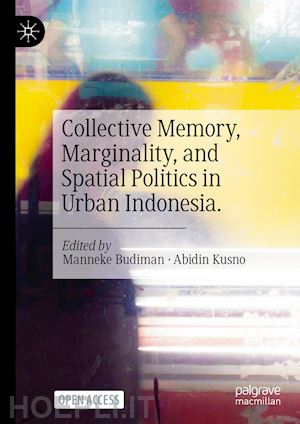
Questo prodotto usufruisce delle SPEDIZIONI GRATIS
selezionando l'opzione Corriere Veloce in fase di ordine.
Pagabile anche con Carta della cultura giovani e del merito, 18App Bonus Cultura e Carta del Docente
This volume presents three important themes for the study of Indonesian politics, cultures, and urban space: 1) urban regeneration and collective memory, 2) marginality and the other archives, 3) mood, medium, and media. Readers will find in the collection elements of urban imaginary and practices as represented in essays on community archiving, heritage, spatial experiments, gangsters and hooligans, sex work and sexual violence, youth subcultures, marketplaces, museums, and elite subdivisions. With this, the book offers readers a way to look at how the contributors approach the ever- shifting urban space as a cultural and political arena: how space is represented, produced and contested and how they are implicated in identity formations today and in the past; how individual and collective memories are fixated, disrupted, or catapulted forward by mobility and spatial transformation; how people, landscapes, buildings, movements join forces in transforming self and space, resulting in significant reconfiguration of politics, culture, and memory.
This is an open access book.
Part 1- URBAN REGENERATION AND COLLECTIVE MEMORY.- Chapter 1-The Mobility of Orkes Dangdut Gerobak in the Urban Space Commodification of Female Sexuality and Patriarchal Capitalism.- Chapter 2 -Orang Rantai in Sawahlunto A State-sponsored Heritage City and the Politics of Collective Memory.- Chapter 3 -Gangsters, Music, and Aremania Modernity and the Dynamics of Arek Malang to Defend their Existence (1970–2000). - Chapter 4 -Urban Regeneration and Images of the “Others” in Cek Toko Sebelah (2016).- Part II. MARGINALITY AND THE OTHER ARCHIVES.- Chapter 5 -Prostitution and Its Social Impact in Gang Dolly, Surabaya (1967–1999).- Chapter 6 - Poverty, Criminality, and Prostitution: Impacts of the Development of Batam as an Industrial City (1971–1998).- Chapter 7 - Pondok Indah and Pondok Pinang from 1973 to 1997: Developing through Interdependency.- Chapter 8 - Community-based Practices of Archiving Indonesian Popular Music: Redefining the Notion of Indonesia.- Part III- NEW MOOD, MEDIUM, AND MEDIA.-Chapter 9 -Traditional Market as a Public Space: Thomas Karsten’s Design for Johar Market in Semarang (1906–1939).-Chapter 10 - Representation of Mooi Indie in Nature-based Tourism Development of Tourism in Bandung from 1925 to 1941.- Chapter 11 - The 2017 Jakarta Gubernatorial Election The Production of Post-Truth and the Islamic, Urban, Middle-Class Identity.- Chapter 12 - Religion in Urban Politics: Social Media and Its Regulatory Debates in the Aftermath of the Jakarta Gubernatorial Election in 2017.
Manneke Budiman teaches literature and cultural studies at the Faculty of Humanities Universitas Indonesia, and is currently the chairperson of the Literature Department. He is a former director of Academic and Learning Resources Development of Universitas Indonesia. (The other information on my bio can be deleted).
Abidin Kusno teaches at the Faculty of Environmental and Urban Change at York University, Toronto. He is a former director of the York Centre for Asian Research (YCAR).











Il sito utilizza cookie ed altri strumenti di tracciamento che raccolgono informazioni dal dispositivo dell’utente. Oltre ai cookie tecnici ed analitici aggregati, strettamente necessari per il funzionamento di questo sito web, previo consenso dell’utente possono essere installati cookie di profilazione e marketing e cookie dei social media. Cliccando su “Accetto tutti i cookie” saranno attivate tutte le categorie di cookie. Per accettare solo deterninate categorie di cookie, cliccare invece su “Impostazioni cookie”. Chiudendo il banner o continuando a navigare saranno installati solo cookie tecnici. Per maggiori dettagli, consultare la Cookie Policy.